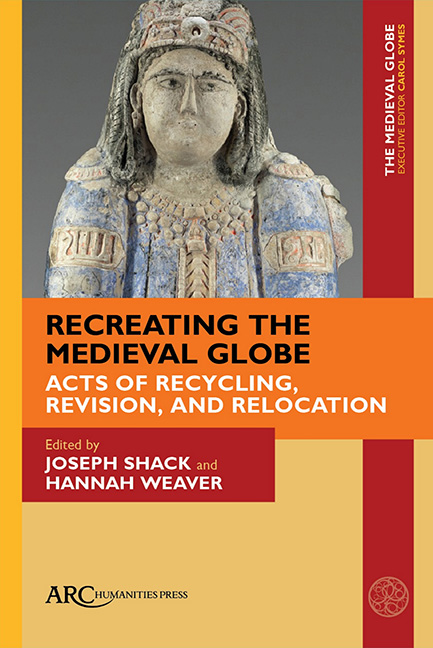Book contents
- Frontmatter
- Contents
- List of Illustrations
- Introduction to Recreating the Medieval Globe: Acts of Recycling, Revision, and Relocation
- Self-Revision and the Arabic Historical Tradition: Identifying Textual Reuse and Reorganization in the Works of al-Balādhurī
- When Curtains Fall: A Shape-Shifting Silk of the Late Abbasid Period
- Salvaging Meaning: The Art of Recycling in Sino-Mongol Quanzhou, ca. 1276–1408
- Recontextualizing Indigenous Knowledge on the Prussian–Lithuanian Frontier, CA. 1380–1410
- Meubles: The Ever Mobile Middle Ages
- Reflection
- Index
Recontextualizing Indigenous Knowledge on the Prussian–Lithuanian Frontier, CA. 1380–1410
Published online by Cambridge University Press: 22 June 2021
- Frontmatter
- Contents
- List of Illustrations
- Introduction to Recreating the Medieval Globe: Acts of Recycling, Revision, and Relocation
- Self-Revision and the Arabic Historical Tradition: Identifying Textual Reuse and Reorganization in the Works of al-Balādhurī
- When Curtains Fall: A Shape-Shifting Silk of the Late Abbasid Period
- Salvaging Meaning: The Art of Recycling in Sino-Mongol Quanzhou, ca. 1276–1408
- Recontextualizing Indigenous Knowledge on the Prussian–Lithuanian Frontier, CA. 1380–1410
- Meubles: The Ever Mobile Middle Ages
- Reflection
- Index
Summary
Gedutte von Wargin offers to serve as a guide along these routes in the wilderness toward Merken; he knows that area well.
THIS ADVERTISEMENT OF Gedutte's expertise introduces one entry in a series of texts called Wegeberichte: brief navigational “route reports” outlining frontier raiding itineraries. Dated between 1384 and 1402, the Wegeberichte were commissioned and compiled by the Teutonic Order, a German crusading institution that exercised lordship over much of the Baltic during the later Middle Ages. The reports regularly begin by promising the reliability of one or more guides (leitsleute) before describing the waypoints and landscapes of the route (or routes) for which they claim responsibility. The entry above, for example, goes on to extend Gedutte's realm of familiarity, ultimately encompassing several thousand square miles in the southeastern corner of modern-day Lithuania—part of a landscape that Teutonic records referred to as “the wilderness” (die wildnis). Tracing a wide arc from northwestern Belarus to the Baltic Sea, the wildnis largely comprised vast wetlands and dense forests that impeded the Order's efforts to incorporate Lithuania and its predominantly pagan population into its Baltic territories. But where the Order feared to tread, the leitsleute ranged freely.
Historians have tended to cast the conflict-laden relations between the Teutonic Order and indigenous Lithuanians as a dramatic contest between two great powers, culminating in the Order's decisive defeat by the united forces of Lithuania and Poland in 1410. Many prewar German narratives bemoaned the unravelling of the Order's military strength, economic power, and moral authority after its Lithuanian crusades, while Lithuanian scholars identified recurring wars with the Order as the crucible of their statehood and national self-consciousness. But despite contemporary conflicts, the contours of political loyalty and religious identity were blurred in the ongoing exchange of supplies and services along the Prussian–Lithuanian frontier. Lithuanian nobles commonly reached across the border to form mutually beneficial diplomatic relationships with Teutonic officials, and treaties brokered safe passage to merchants, even if trade with a pagan enemy carried a tinge of illicitness. Of the commodities circulating through the frontier, expertise in navigating the wilderness was particularly valuable to the Order.
- Type
- Chapter
- Information
- Recreating the Medieval GlobeActs of Recycling, Revision, and Relocation, pp. 93 - 120Publisher: Amsterdam University PressPrint publication year: 2020



